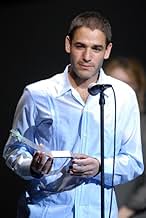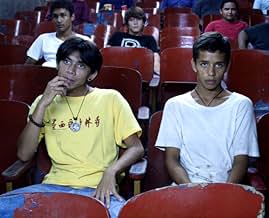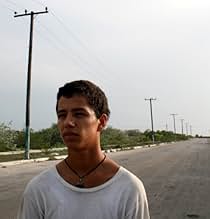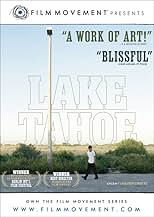Lake Tahoe
- 2008
- Tous publics
- 1h 29m
IMDb RATING
6.6/10
1.8K
YOUR RATING
A story of a teenager and the strange events that take place in his small town.A story of a teenager and the strange events that take place in his small town.A story of a teenager and the strange events that take place in his small town.
- Director
- Writers
- Stars
- Awards
- 10 wins & 9 nominations total
- Director
- Writers
- All cast & crew
- Production, box office & more at IMDbPro
Featured reviews
In Fernando Eimbcke's peculiar film, a young man crashes his car in the sleepy Mexican town where his family lives. No-one seems interested in fixing it. Eventually, someone does. His engagements with the various oddballs he meets while trying to repair it are set against the backdrop of the recent death of his father. And that's it. The film seems part a meditation on cosmic loneliness, and part a satire on national decay, but I've rarely seen a film with so little dialogue and action: each scene is separated by a black interlude, and much of the plot is implied in the gaps, rather than shown. Eimbcke succeeds in creating a mood, but the absence of any conventional storytelling imperative makes it a sparse experience. It feels more like a proof of concept than a completely finished movie.
This movie reminds me so much of the Beatles song "A Day in the Life". It's disjoint, existential, seemingly apathetic, and yet it carries a sense of poetry & meaning that's a beauty to behold.
The plot is as simple as it gets: a young man crashes his car and spends the day trying to get it fixed. But the heart of the film is in how it's told. We get a series of fixed camera shots with little or no action except for 1 or 2 characters. It gives the impression of a photo album where the pictures come to life. There's no music. Dialogue is sparse and economical; not a word is wasted. Actors are virtually expressionless through most of the film, but that only adds to the power as we try to decipher what they're feeling beneath their stoic exteriors.
Other directors have used this minimalist approach to varying degrees of success. In this case, I think it's very effective. Despite the long, static, wordless shots, there's a sense of mystery & intrigue that builds up as we are forced to piece together what is happening and, more importantly, what happened before the story. That's what this movie is about--not really what we're watching but the unseen events that led us to this point. It's almost like we're watching a shadow or reflection of a much larger story. If you approach it this way, I guarantee it'll awaken your imagination, and your brain will be lit up like a Christmas tree by the end.
There's not much more I can say about the film except to compare it with other films that have given me the same feeling. Top on the list would be 2001: A SPACE ODYSSEY, the masterpiece of visual storytelling & puzzle-building. Anything by the Japanese master Takeshi Kitano falls into the same category (FIREWORKS, KIKUJIRO, DOLLS, A SCENE AT THE SEA, etc). THE HOLE and THE RIVER by Taiwanese director Ming-liang Tsai are right up this alley. MABOROSI ("Illusory Light") by Hirokazu Koreeda is another film that takes the same approach. And SONGS FROM THE SECOND FLOOR by Swedish director Roy Andersson gives us a similar taste. All of these are excellent, poetic films that use the camera as an objective observer without any flashy gimmicks to lead us. Instead it forces us, the audience, to take in every detail and use our brains a bit.
What sets this film apart from most of the others is that it has a strong sense of humour. Nothing outright lol-worthy, but amusing nonetheless. For example, we see a man and a dog each eating a bowl of Cheerios, perfectly choreographed to finish at the same time. I got a smile out of that & maybe you will too. Other scenes are so awkwardly hilarious (like an auto mechanic who is obsessed with Bruce Lee) that you can't help but chuckle. What makes it so funny is that these are things that probably happen to all of us in our everyday lives, but we never really take notice. This movie gives us the opportunity to scrutinize the strange things that happen to us all, and that's what makes it so intriguing.
I highly recommend it, and you don't even have to be an expert cinephile to appreciate it. If you watch it & like it, go check out the other films I've listed in this review (or if you hate it, be sure to avoid the films I've mentioned!).
The plot is as simple as it gets: a young man crashes his car and spends the day trying to get it fixed. But the heart of the film is in how it's told. We get a series of fixed camera shots with little or no action except for 1 or 2 characters. It gives the impression of a photo album where the pictures come to life. There's no music. Dialogue is sparse and economical; not a word is wasted. Actors are virtually expressionless through most of the film, but that only adds to the power as we try to decipher what they're feeling beneath their stoic exteriors.
Other directors have used this minimalist approach to varying degrees of success. In this case, I think it's very effective. Despite the long, static, wordless shots, there's a sense of mystery & intrigue that builds up as we are forced to piece together what is happening and, more importantly, what happened before the story. That's what this movie is about--not really what we're watching but the unseen events that led us to this point. It's almost like we're watching a shadow or reflection of a much larger story. If you approach it this way, I guarantee it'll awaken your imagination, and your brain will be lit up like a Christmas tree by the end.
There's not much more I can say about the film except to compare it with other films that have given me the same feeling. Top on the list would be 2001: A SPACE ODYSSEY, the masterpiece of visual storytelling & puzzle-building. Anything by the Japanese master Takeshi Kitano falls into the same category (FIREWORKS, KIKUJIRO, DOLLS, A SCENE AT THE SEA, etc). THE HOLE and THE RIVER by Taiwanese director Ming-liang Tsai are right up this alley. MABOROSI ("Illusory Light") by Hirokazu Koreeda is another film that takes the same approach. And SONGS FROM THE SECOND FLOOR by Swedish director Roy Andersson gives us a similar taste. All of these are excellent, poetic films that use the camera as an objective observer without any flashy gimmicks to lead us. Instead it forces us, the audience, to take in every detail and use our brains a bit.
What sets this film apart from most of the others is that it has a strong sense of humour. Nothing outright lol-worthy, but amusing nonetheless. For example, we see a man and a dog each eating a bowl of Cheerios, perfectly choreographed to finish at the same time. I got a smile out of that & maybe you will too. Other scenes are so awkwardly hilarious (like an auto mechanic who is obsessed with Bruce Lee) that you can't help but chuckle. What makes it so funny is that these are things that probably happen to all of us in our everyday lives, but we never really take notice. This movie gives us the opportunity to scrutinize the strange things that happen to us all, and that's what makes it so intriguing.
I highly recommend it, and you don't even have to be an expert cinephile to appreciate it. If you watch it & like it, go check out the other films I've listed in this review (or if you hate it, be sure to avoid the films I've mentioned!).
This movie, albeit slow, contains a lot of universal humanistic aspects. The power isn't in the acting, direction or camera work, it's the combination of these that brings a lot of soul to the screen. This is what I would personally call a film which contains wisdom. It has been a real treat viewing this, even though I remained critical of its direction. Once you get used to the pace of it, you'll get dragged along.
A friend recommended I should see this, so I did. The 'ZEN'-shot of one of the car mechanic companies did not surprise me, and the many references to Kung Fu and Eastern philosophies were great. You should try to watch this film without too much criticism. Then it's definitely worth it.
To summarize, I admire this film's innocence. Minimal script, minimal acting, minimal direction. It leaves a lot to the imagination, a real feast if you're open to it.
A friend recommended I should see this, so I did. The 'ZEN'-shot of one of the car mechanic companies did not surprise me, and the many references to Kung Fu and Eastern philosophies were great. You should try to watch this film without too much criticism. Then it's definitely worth it.
To summarize, I admire this film's innocence. Minimal script, minimal acting, minimal direction. It leaves a lot to the imagination, a real feast if you're open to it.
Teen Juan (Diego Cataño) crashes the family car into a pole. He searches the quiet streets for help to fix the car. He encounters paranoid mechanic Don Heber and his dog. Then there is young mother Lucia. And there is David the young mechanic who is obsessed with kung fu.
This is extremely slow and minimalist. It is a Mexican indie. It's visually bright like a sleepy summer day. I'm fine with some long artistic shots but this has way too much of them. The movie is only an hour and a half. It feels like half of it has nothing in it. The other half has very quiet acting going on which doesn't showcase any big acting skills. It is an art film to be sure. I just never felt any excitement for this movie even when the backstory is revealed.
This is extremely slow and minimalist. It is a Mexican indie. It's visually bright like a sleepy summer day. I'm fine with some long artistic shots but this has way too much of them. The movie is only an hour and a half. It feels like half of it has nothing in it. The other half has very quiet acting going on which doesn't showcase any big acting skills. It is an art film to be sure. I just never felt any excitement for this movie even when the backstory is revealed.
Let us get all our facts and views clear about this quasi Avant-Garde Mexican film.Fernando Eimbecke's second film "Lake Tahoe" is not at all an existentialist film.It is a film of absurd ideas involving numerous boisterous undertones but not in the same tradition as that of Monty Python type of films.The viewers' interest in the film is generated right from the beginning as it takes place in some obscure sleepy town in Mexico where hardly anybody could be seen on the streets.It appears as if a lost ghost town is being portrayed on the screen.Those who look for perfection in the form of innovative cinematography would not be deceived as "Lake Tahoe" features some of the most well executed, well planned camera angels which would even put late Nestor Almendros to shame.Fernando Eimbecke is a prolific young director but it is rather unfortunate that he has been compared to the great master of cinema Luis Bunuel.He is just two films old and it is easily evident that he has a golden future ahead of him but such a tempting comparison in the early part of a young person's career might turn out to be counter productive.A final word of warning.Those who are looking for a meaningful story will be highly disappointed.This is not hard to swallow as Godard uncle stated a very long time ago that films should have a beginning, a middle, and an end... but not necessarily in that order.
Details
Box office
- Gross worldwide
- $219,244
- Runtime
- 1h 29m(89 min)
- Color
- Aspect ratio
- 2.35 : 1
Contribute to this page
Suggest an edit or add missing content










